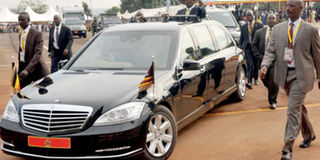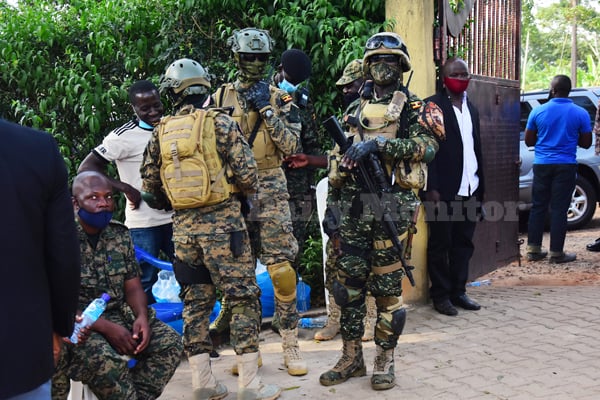Prime
Who are VIPPU bodyguards?

President Museveni's convoy is usually dominated by the Special Forces Command (SFC) that carry firearms. PHOTO/FILE/COURTESY
What you need to know:
- Most important public figures, including heads of state, heads of government, are protected by several bodyguards or by a team of bodyguards from a government agency, security forces, or police forces.
Bodyguards are close protection personnel who safeguard very important persons (VIPs), who are high-risk principals, usually high-ranking public officials or security officers.
Most important public figures, including heads of state, heads of government, are protected by several bodyguards or by a team of bodyguards from a government agency, security forces, or police forces.
In Uganda, the Very Important Persons Protection Unit (VIPPU) personnel guard head of institutions such as the Uganda Revenue Authority (URA), Uganda National Roads Authority (Unra), Kampala Capital City Authority (KCCA) and the Chief Justice and tens of other judicial officers. They are also hired to guard or protect from danger some wealthy persons, and celebrities or socialites.
The VIPPU personnel undergo specialised training in evacuation of their principals, close combat engagements both armed and unarmed and anti-terrorism engagements.
Their training last somewhere between three and six months. They also undergo training in firearms tactics, unarmed combat, tactical driving, and administering first aid.
A source who has been a bodyguard for nearly 10 years told Saturday Monitor that in situations where there are more than one agent, one or more bodyguards may have training in specific tasks, such as providing a protective escort, crowd screening and control, or searching for explosives or electronic surveillance devices.
“They are trained on examining premises or venues before their clients arrive, to determine where the exits and entrances are, find potential security weaknesses, and meet the staff,” the source said.
“In our last training under JATT [the Joint Anti-Terrorism Taskforce), we went and spent six months. We were trained by Israelis and Koreans,” the source said. “The instructors didn’t even know our language and will never listen to you, so you don’t have any way of explaining yourself to them.”
Our source said the training equips them to handle all arduous tasks assigned.
“After completing training in VVIP protection, you are assigned to a specific principal. Your assignment starts with picking up the person from home, and making sure he or she is safe throughout the day until when he or she is dropped off at home again,” the source says.
Their tasks include ensuring the person is out of harm’s way all the time, directing the person on what to do and what not to do and ensuring everything is right all the time.
“We do this to ensure they are safe, but sometimes you get those who do not understand our work and would want to direct you and yet when things go wrong, you are the first to take the blame and responsibility,” the source said.
The source said their roles, among others, include planning routes, pre-searching rooms and buildings where the client will be visiting, researching the background of people who will have contact with the client, searching vehicles, and attentively escorting the client on their day-to-day activities.
The source said the assignments for a bodyguard involves close to death interactions at all times and that “even when trained, you know anytime you can get caught up in life and death situations,” the source said.
“You know the person who fears a gun most is the person trained in using the gun because we know how dangerous it is and how it kills,” the source said.

An SFC commando pictured during training. VVIP guards are usually heavily armed. PHOTO/FILE
Mr Freddie Egesa, a private investigator who has handled a number of investigations, says the bodyguards must be alert at all times even when there seems to be no perceived danger. He says this gives them an advantage when something happens abruptly, they instantly react.
What the training should make them understand is that when you hear any sound, treat it as a danger and respond immediately. When you are in the car and the vehicle reduces to 40km/h, be alert because at this speed, if someone is trailing you, the person catches up with you and can act very fast,” he says.
He also says the bodyguard should be trained in both defensive and offensive manoeuvers so that at all times, he or she is ready to respond as the situation demands.
Dangers
Our sources say the bodyguards also face the biggest dangers in ensuring their principals are safe.
The source said if anything happens, the bodyguard must respond immediately to safeguard the principal.
“However, the first protection must be your life because if you are dead, you cannot defend the principal, so make sure you are safe so that you can protect the other person,” the source says.
“When you sit in that enclosed car, you have a very narrow space and the threat levels increase so you have to be alert all the time,” the source adds.
Numbers
In the last seven years, the strength of the Very Important Persons Protection Unit (VIPPU) has grown from 1,746 officers to 3,500-4,500.
The numbers of police personnel guarding each head of institutions such as the Uganda Revenue Authority, Uganda National Roads Authority, Kampala Capital City Authority and Chief Justice, ranges from 15 to 30 officers.
There are close to 80 judicial officers entitled to police protection and are given a total of around 560 and 600 police officers a day to secure their lives and property.
VVIP guards...Weapons and tactics
Our source said in Uganda, a typical bodyguard is usually armed with a pistol when guarding the principal at office and places that are well mapped.
However, should the trip involves upcountry movement, they are assigned assault rifles because some dangers demand that you hit the target from afar, while others can be handled from close range using pistols.
“Some bodyguards, including those protecting high ranking government officials or those operating in high-risk environments such as war zones, may carry assault rifles or higher grade guns,” a source says.
Our sources say as close protection officers, the bodyguards must avoid exposing the principal to the risk of being fired upon by keeping him or her in a secure structure. The source says this is common in dealing with snipers whose positions are often concealed and difficult to locate.





